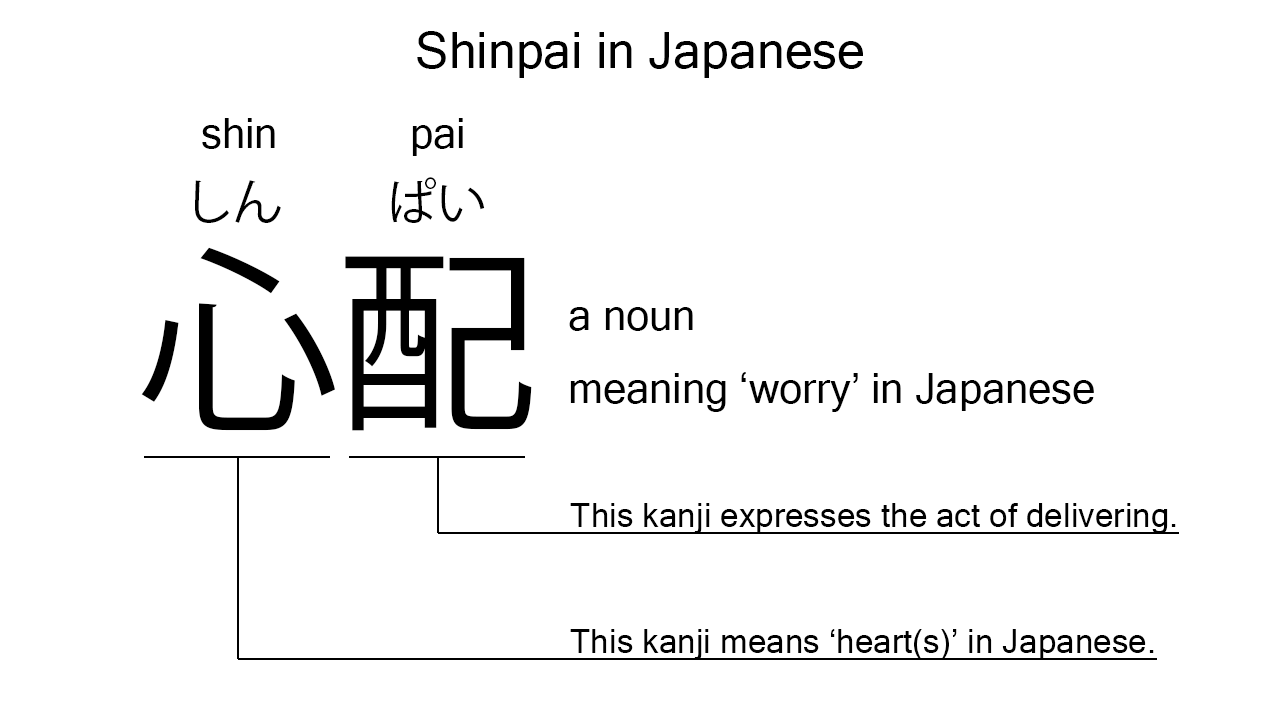What does “shinpai” mean in Japanese?
Native speakers say “shinpai” to mean ‘worry’ in Japanese. Perhaps, some Japanese learners know this word as it is sometimes used in Japanese conversations. In this blog post, however, I will explain this word in detail based on its kanji expression. And also, I will explain how to use it through example sentences. My explanations would help Japanese learners understand “shinpai” more clearly. Then, let’s get started!
Contents
Definition and meanings of “shinpai”
Let me start with the definition and meanings of “shinpai”.
- shinpai – 心配 (しんぱい) : a noun meaning ‘worry’ or ‘anxiety’ in Japanese. This can also work as plural. Learn more about Japanese plural.
Native speakers use this noun normally to refer to a worry or anxiety in Japanese. It’s also worth mentioning here that they sometimes use this to say “I’m worried” or such especially in speaking.
The definition and meanings are not that difficult. To understand this noun more clearly, however, let me explain its kanji characters in detail, one by one.
Shinpai in kanji
The kanji expression of “shinpai” consists of the following two kanji characters:
- 心 : a kanji character used to mean ‘heart’, ‘mind’, or ‘feeling’ in Japanese.
- 配 : a kanji character used to express the act of delivering.
These two kanji characters tell us that “shinpai” literally means ‘heart delivering’ in Japanese. This literal interpretation is not in line with the actual meaning, but still understandable, I think. In Japanese, being worried about something is considered as delivering his/her heart to the object.

When we meet new kanji expressions, we should check their kanji characters in detail to understand their meanings clearly and deeply. In many cases, kanji characters tell us a lot about the meanings of the expressions they form. Actually, here, we could get the better understanding of “shinpai” through the detailed kanji check above.
So far, I’ve explained the definition and meanings of “shinpai” together with its kanji characters. Then, let me explain how to use it through the example sentences below.
Example #1: how to say “worry” in Japanese
watashi no shinpai wa musume tachi desu – 私の心配は娘達です (わたしのしんぱいはむすめたちです)
My worry is my daughters.
Below are the new words used in the example sentence.
- watashi – 私 (わたし) : a pronoun meaning ‘I’ in Japanese.
- no – の : a case particle used after a noun or pronoun to make its possessive case. In the example, this is used after “watashi” to make its possessive case, “watashi no“, which means ‘my’ in Japanese.
- wa – は : a binding particle working as a case marker or topic marker. In the example, this works after “watashi no shinpai” to make the subject in the sentence.
- musume – 娘 (むすめ) : a noun meaning ‘daughter’ in Japanese. This can also work as plural.
- tachi – 達 (たち) : a suffix used after a noun or pronoun to make its plural form. In the example, this is used after “musume” to make its plural form, “musume tachi”, which means ‘daughters’ in Japanese.
- desu – です : an auxiliary verb used after a noun or adjective to make it polite. Probably, this is well known as a part of Japanese desu form. In the example, this is used after “musume tachi” to make it sound polite.
This is a typical usage of “shinpai”. In this example, it works as a part of the noun phrase, “watashi no shinpai”, which means ‘my worry’ in Japanese.
Example #2: another usage of “shinpai”
musuko ni shinpai wa nai desu – 息子に心配はないです (むすこにしんぱいはないです)
I don’t have any worry about my son.
Below are the new words used in the example sentence.
- musuko – 息子 (むすこ) : a noun meaning ‘son’ in Japanese. This can also work as plural.
- ni – に : a case particle used to indicate the object to which an action is directed. In the example, this is used after “musuko” to indicate the object about which the speaker doesn’t have any worry.
- nai – ない : an i-adjective used to say that something does not exist. In the example, this is used to say that the speaker does not have any worry about his son.
This is another typical usage of “shinpai”. In this example, it works as a part of the commonly-used phrase, “shinpai wa nai”, which literally means ‘a worry does not exit’ in Japanese. It is often translated into English as ‘not to have any worry’, though. When we want to say “worry” in Japanese, anyway, “shinpai” is always a very good option.
Summary
In this blog post, I’ve explained the definition and meanings of “shinpai” in detail based on its kanji expression. And also, I’ve explained how to use it through the example sentences. Let me summarize them as follows.
- shinpai – 心配 (しんぱい) : a noun meaning ‘worry’ or ‘anxiety’ in Japanese. This can also work as plural. These two kanji characters literally mean ‘heart delivering’ in Japanese. This literal interpretation is not in line with the actual meaning, but still understandable, I think. In Japanese, being worried about something is considered as delivering his/her heart to the object. Native speakers use this noun normally to refer to a worry or anxiety in Japanese. It’s also worth mentioning here that they sometimes use this to say “I’m worried” or such especially in speaking.
Hope my explanations are understandable and helpful for Japanese learners.